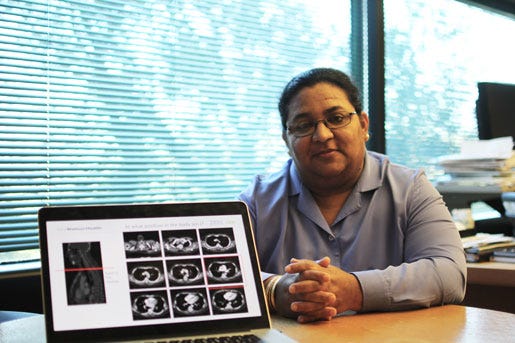Medical Imaging, Powered by IBM
November 29, 2016
IBM Watson Health and Merge Healthcare are bringing new insights, made possible through artificial intelligence and cognitive computing, to medical imaging.

Dr. Tanveer Syeda-Mahmood developed a tool that uses IBM Watson Health technology to help clinicians detect heart disease. Syeda-Mahmood is an IBM Fellow and chief scientist of the Medical Sieve Radiology Grand Challenge Project at IBM Research.
Radiologists are about to get some help with their imaging workload.
IBM Watson Health and Merge Healthcare, an IBM Company, are showcasing new tools to help clinicians analyze medical images. The offerings use machine learning, artificial intelligence, and cognitive computing to offer additional information that can help tailor diagnosis and treatment decisions.
To give physicians a better understanding of the IBM technology, IBM Research is also conducting a live demonstration of the tools at the Radiological Society of North America Annual Meeting (RSNA) in Chicago, according to a press release.
The release notes that at least 90% of all medical data is images, according to IBM researchers' estimates, and that medical images are growing at the fastest rate of any type of medical data. Accuracy can suffer in the face of all these images that need to be analyzed, referenced, and compared by humans.
An oft-cited Johns Hopkins study published in 2013 revealed how frequently diagnostic errors happen and how devastating they can be. Researches estimated that 80,000-160,000 U.S. patients experience permanent injury or death related to misdiagnosis each year.
"We designed this Watson-based demonstration to show physicians that soon they can navigate an abundance of digital data--structured and unstructured, text and images--and make informed decisions based on relevant and current information," Dr. Tanveer Syeda-Mahmood, an IBM Fellow and chief scientist of the Medical Sieve Radiology Grand Challenge Project at IBM Research, said in an IBM Research blog post. "More importantly, we can analyze a broad array of medical data and derive Watson-powered insights that are meaningful to doctors."
Syeda-Mahmood had a personal reason for her interest in using Watson to help analyze medical images. According to an IBM profile of the researcher, her father suffered a hemorrhagic stroke that was misdiagnosed as an ischemic stroke. He was given blood thinners as a result of this mistaken diagnosis. His condition worsened and he went into a coma. Happily, her father eventually recovered after medical repatriation to India and treatment there.
According to the blog post, that experience drove Syeda-Mahmood to research ways to enable more accurate diagnoses.
At RSNA, Watson Health and Merge will both showcase new offerings, according to the press release. Watson Health will debut a cognitive peer review tool to clarify differences between a patient's health record and clinical evidence; a cognitive data summarization tool offering personalized patient information for interpretation, diagnosis, and treatment decisions; a cognitive physician support tool to enable personalized decisions using the entirety of patient data; and the MedyMatch "Brain Bleed" App to help diagnose a trauma patient with brain bleed or stroke.
The release also details the products Merge will show, including Marktation, a tool that enables faster image interpretation and will be used first in mammography; Watson Clinical Integration Module, a cloud application that radiologists can use to improve efficiency and reduce errors; and the Lesion Segmentation and Tracking Module, to allow faster interpretation and reporting of comparison exams.
"Watson cognitive computing is ideally suited to support radiologists on their journey 'Beyond Imaging' to practices that address the needs of patient populations, deliver improved patient outcomes, and demonstrate real-world value," said Nancy Koenig, general manager of Merge Healthcare, in the release. "This week at RSNA, Merge is proud to unveil solutions for providers that enable the first steps on the cognitive care journey, addressing breast cancer, lung cancer, and trauma patients in the ER."
[Image courtesy of IBM RESEARCH]
About the Author(s)
You May Also Like


